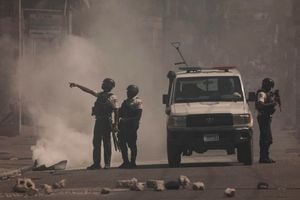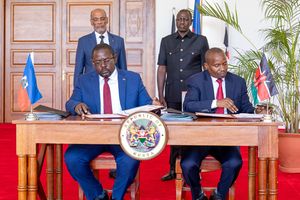
Police recruits perform marching drills during a past Kenya police pass out parade at Kiganjo Police Training College in Nyeri County.
The first team of Kenyan police officers are set to land in Haiti next week.
Officials aware of the deployment have revealed that the first team of about 200 officers are set to arrive in the Caribbean nation on May 23/24, timed to coincide with a state visit by President William Ruto to the United States.
The deployment comes seven months after the United Nations Security Council gave Kenya the go-ahead to lead the multinational mission.
It also comes days after the US military embarked on the establishment of a barrack in Haiti where Kenyan police officers will be operating from, the Nation has confirmed.
The operation, which the US Southern Command is coordinating, saw several civilian contractors being deployed to Haiti’s capital Port-au-Prince to put up the base.
In a statement released earlier this week, the Southern Command said the civilians will be working alongside officials at Haiti’s main airport “to secure the equipment and supplies that have arrived in Haiti.”
The National Police Service officers who are set to be deployed are drawn from the elite Recce Squad, Rapid Deployment Force and Special Operation Group.
The latter have been fighting al-Shabaab insurgents along the Kenya–Somalia border.
Half of the contingent are expected to secure critical installations, including the airport, while the rest will be involved in close-quarter combat against gangs that have taken control of over 80 per cent of Port au Prince.
According to the statement by the Southern Command, there has been continuous support from various individuals in Haiti, who ensured that the airport remained open despite the presence of the vicious gangs which have been causing chaos across the country.
Plans to deploy the multinational security force were almost scampered in March this year when former Haiti’s former Prime Minister Ariel Henry resigned from the position following a series of violent attacks against civilians that were carried out in the country.
Mr Henry had visited Kenya’s capital Nairobi to discuss the deployment of the police officers to his country but it became difficult for him to go back home.
Foreign Affairs Principal Secretary Korir Sing'oei said last week that the Kenyan police officers are now ready to deploy.
Apart from Kenya, other countries that will send their officers to Haiti are Chile, Jamaica, Grenada, Paraguay, Burundi, Chad, Nigeria and Mauritius.
Kenya will lead the multinational operation in Haiti to fight gangs and plans to deploy more than 1,000 officers to Haiti to help in the mission.
In February, a three-day meeting took place in the US where the deployment of Kenyan officers was discussed.
Deputy National Security Advisor Joseph Boinnet led the Kenyan delegation.
During the meeting, a Memorandum of Understanding (MoU) was drafted which included the date when the Kenyan officers were expected to arrive in Haiti.
However, the plans to have the Kenyan officers sent to Haiti were disrupted by the resignation of Haiti’s Prime Minister.
Nine individuals in Haiti who have been tasked with forming the next government are currently in charge of the country.
The UN, which has joined the US in calling for assistance for the multinational force and humanitarian response, has said that the Kenyan-led mission needs to deploy as quickly as possible.
Elections in Haiti were last held in 2016.
The transitional body is scheduled to lead the country until fresh polls can take place, with an elected government to take over by February 6, 2026.
It is worth noting that gang leaders in Haiti plus officials of various activism groups are opposed to the deployment of Kenyan police officers to the country.










